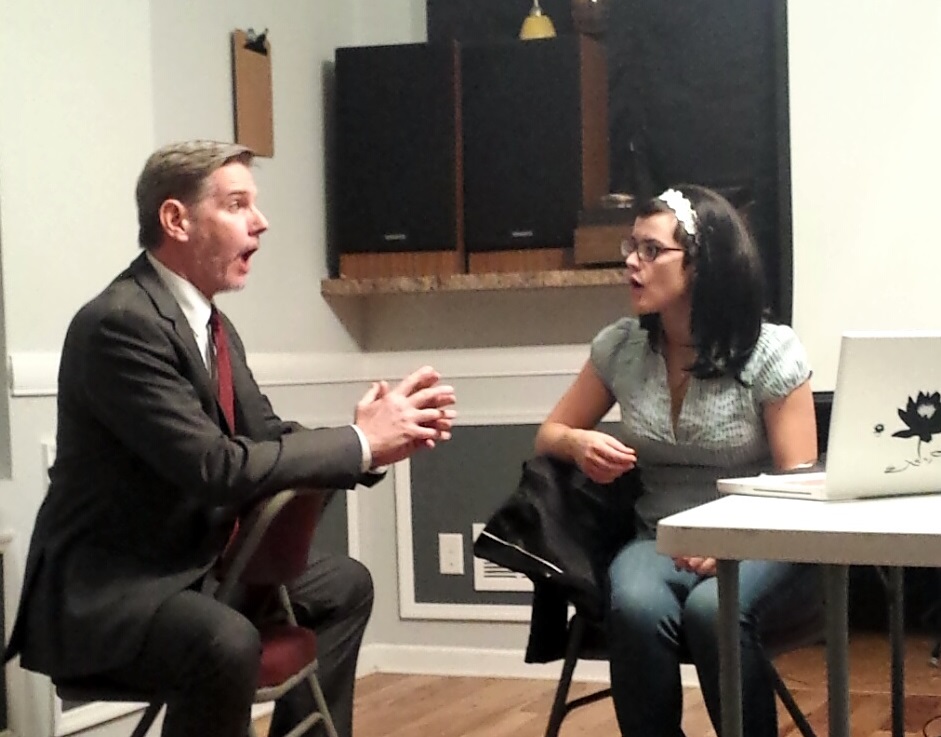
In the aftermath of Pink Punch, the audience at the Art Church of West Philadelphia decompressed during an intermission, eager for SORRY, BROKEN PIANO. The story centers on a platonic couple—John (Chris Braak), a podcast DJ; and Karen (Kristen Norine), his tireless producer—and their mission to conquer the late-night dregs-of-society demographic.
Their popular indie podcast, Shithead in a Basement—where John gives his therapeutic, albeit cynical take on life as a sort of surrogate therapist for those in need of some acerbic relief—is on the brink of breakout success. Especially after having caught the attention of corporate radio stooge, Tom (Tom Tansey), hell bent on making John the next “shock jock” superstar, caught my attention early.
The actors seem perfectly cast in their roles. John embodies the sardonic under-achiever, a disheveled mess, with a voice frighteningly similar to the “shock jock” king himself, Howard Stern. Karen, the quintessential caterpillar, poised for butterfly-dom, epitomizes the shy, anal-retentive neurotic. Tom, with his perfect yuppie drawl, personifies the ultimate out-of-touch business dork.
Unfortunately, though, the actual podcast is conspicuously absent from the play. I kept hoping we would get to see John, on air, in his full glory, ripping into something he loathes, or tearing down some snide listener calling in, or just going off on some Bill Hicks-esque rant—a feat he would have reveled in and which would have really allowed Braak to flourish in his role.
Sadly, that eruption never really comes, save for a brief moment toward the end in which John cuts down some drunken frat boy, via a streaming video Karen watches of an event he is hosting—easy prey for John, maybe too easy; maybe even a little safe, which felt totally out of place in an evening that had previously taken such glorious chances with Cara Blouin’s hysterical Pink Punch.
Instead, SORRY, BROKEN PIANO, also by Blouin, attempts to articulate the conflicting desires of our three main characters, meandering down several potential storylines without ever committing to one. For instance, Tom wants John to be the boneheaded ringleader of radio raunch (like Philadelphia’s gross-out duo Preston and Steve) to attract new listeners and line their silken pockets, even if that means risking John’s sobriety—another half-baked storyline in this podcast drama.
Karen, not unlike Tom, is intent on controlling John. In addition, she and John engage in some kind of non-sexual, co-dependent relationship which, unfortunately, is never fully fleshed out. All the while, John acts like a selfish jerk, giving the middle finger to the opportunities he secretly desires. He comes off more like an angry teenager than a brooding alcoholic adult. In the end, we only hear about John’s razor wit and anti-hero charm, but never get to experience it first-hand.
Bottom line: Pink Punch’s simplicity and succinctness allow it to become a complex, multi-faceted, galloping beast of a performance, whereas SORRY, BROKEN PIANO recklessly lumbers along, grasping for complexity, without ever quite finding its feet. Ultimately, SORRY, BROKEN PIANO, feels like a loose end that left me scratching my head.
[Art Church of West Philadelphia] January 22-29, 2016; westphiladelphiaartchurch.org. SORRY, BROKEN PIANO runs with another play, Pink Punch (read accompanying review).
